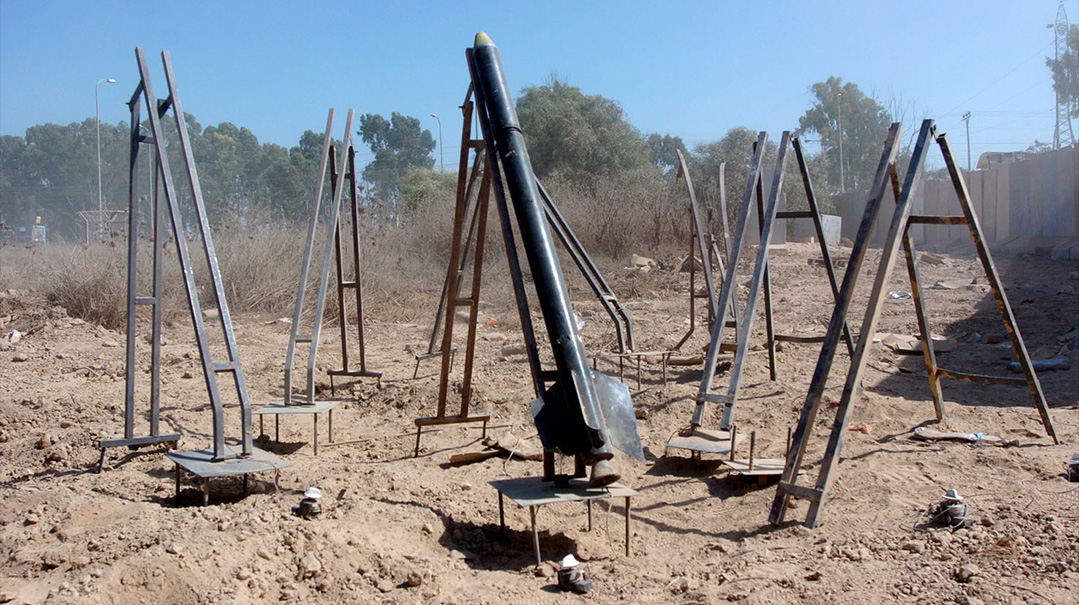All That Open Ground

But how blind can we be? Like the Kassam rockets of yore, where is all this “open space”?

Photo: Israel Defense Forces
Sometime in 2005, as Israeli troops prepared to drag Jewish families out of their homes in Gush Katif, Rav Moshe Shapira ztz”l noted something odd about Kassam rockets.
In those pre-Iron Dome days, the Gazan terror groups would fire mortar rounds and crude rockets at nearby towns like Sderot and Ashkelon unchecked. Gradually, Israelis grew resigned to the fact that the terrorists could send thousands of civilians fleeing for the shelters.
Adding to the sense of resignation was the fact that the Kassams missed their targets most of the time. As contemporary news reports had it, the missiles fell in “shetach patuach” — open ground.
It took Rav Moshe, though, to notice the absurdity of the reports.
“This is a tiny country, with no room to build in, no space to move,” he exclaimed once. “So where is all this shetach patuach that they speak of, that the rockets keep falling on?! The rockets land all around cities, in between homes, in backyards, but they miss time and again. We’ve become used to it, but what we’re seeing is a miracle.”
I was reminded of that long-ago observation by two security incidents that — like the Kassams — were brushed aside as the equivalent of rockets falling in open ground.
Two weeks ago, a terrorist left a bomb on a bus in the chareidi city of Beitar. Had it exploded, the device would have maimed and killed countless people.
Instead, it emitted smoke on the back seat of the bus before being detected.
Just one of a series of near-misses and attacks foiled by security services in the last few months, the incident didn’t even make it into the next edition of this magazine.
The second such incident happened last week. In a serious security breach, a suspected Hezbollah operative crossed the northern border from Lebanon and made his way deep into Israel. He planted a sophisticated bomb at the Megiddo junction, and proceeded with his escape, before being shot by counterterror police.
Instead of the mass casualty event that the operative had planned at the normally busy intersection, only one man — an Arab-Israeli — fell victim.
Alongside the tragedies of life in Israel — of the type where the Paley boys were recently mowed down — these types of near-misses are so common that they receive almost no attention.
But how blind can we be? Like the Kassam rockets of yore, where is all this “open space”?
In our world, the wonders of Hashgachah pratis fill books, education curricula, and chizuk gatherings.
But the wonder that we’re prepared to express about a plane providentially missed or a shidduch that miraculously came together often doesn’t extend to Israel.
Given the history of tension between the chareidi world and Israel’s secular majority, it’s not surprising. The result, though, is that we throw out the baby with the Zionist bathwater.
But occasionally it’s time to look beyond the ideology and “-isms” to see the “open ground” — the sheer, tenuous unlikeliness that we take for granted as life in Israel.
The way that, surrounded by Arab hate, millions of Jews live relatively safe and prosperous, in our ancient homeland.
The fact that we can visit the Kosel without opposition from an Ottoman pasha or a Mandate soldier.
The reality that despite the hostility of a secular elite, the biggest center of Torah that the world has ever seen, is now in Eretz Yisrael.
The miracle that amid the terror attacks and rockets, so often both terrorists and rockets fall on that nonexistent open ground.
“Language not dissimilar to that used by Germany in the ’30s”
The above Tweet by high-profile BBC commentator Gary Lineker, comparing the UK government’s crackdown on illegal immigrants to prewar Nazi policy, is a new low in the misuse of Holocaust memory.
The former soccer star’s intervention triggered a suspension from the media giant, which is state-funded and thus expected to remain impartial. But in the wake of popular support for Lineker, the BBC performed a humiliating volte-face, and the commentator was reinstated.
Almost forgotten in the brouhaha about the BBC’s independence was the simple fact that almost nothing compares to the systematic persecution of the Jews in Nazi Germany — certainly not a legitimate attempt to secure a hemorrhaging border.
But now that the Holocaust has been universalized and co-opted by the left as an anti-discrimination battle cry, who cares how the Jews feel about it?
Isolationist Impulse
Ron DeSantis finally has a foreign policy, and it’s wrong. Trump’s current rival for the 2024 Republican nomination moved last week beyond culture wars and immigration to stake out a position on Ukraine that unsettled the GOP establishment.
“While the US has many vital national interests,” he told Fox, “becoming further entangled in a territorial dispute between Ukraine and Russia is not one of them.”
With these words, the Florida governor reinforced his credentials as the Trumpian who isn’t Trump, and all but guaranteed that the Ukrainians will be rooting for the Democrats next year, to keep open the flow of arms and cash for their fight against Russia.
But while DeSantis has healthy instincts on many issues, this isn’t one of them. Whether America can afford to finance a proxy war against Russia is an open question, but it’s certainly in the US interest to see Kyiv win.
That’s because US engagement with the rest of the world has never been solely about altruism, but about creating a system of rules that ultimately makes it a safe place for Americans to travel and trade.
More broadly, if not for overwhelming American power, the world’s sea lanes would be closed, and Walmart shelves far emptier.
And lastly, DeSantis’s isolationist impulse is misconceived, because if Putin were to come for the rest of Eastern and Central Europe, history shows that America would eventually be sucked back into the Old Continent — at far greater cost then at present.
5 million
First prize for magic money goes to the San Francisco Board of Supervisors. The city’s legislative body reportedly heard with interest a series of recommendations to redress historic wrongs against the black community, mostly involving a spending spree.
According to the Guardian, terms include “payments of $5 million to every eligible black adult, the elimination of personal debt and tax burdens, guaranteed annual incomes of at least $97,000 for 250 years and homes in San Francisco for just $1 a family.”
Opponents of the move point out that California was never a slave state, but the move seems to be more about progressive one-upmanship than about historical accuracy.
Whether the city will pass the measures is beyond the ken of this column, but one thing is for sure: any opposition to the measures, which could cost non-qualifying residents $600,000 each, must be racist.
As the Guardian quoted some Board of Supervisors members as saying: “Money should not stop the city from doing the right thing.”
On a taxpayer-funded salary of $140,000, Board members would know.
(Originally featured in Mishpacha, Issue 954)
Oops! We could not locate your form.







